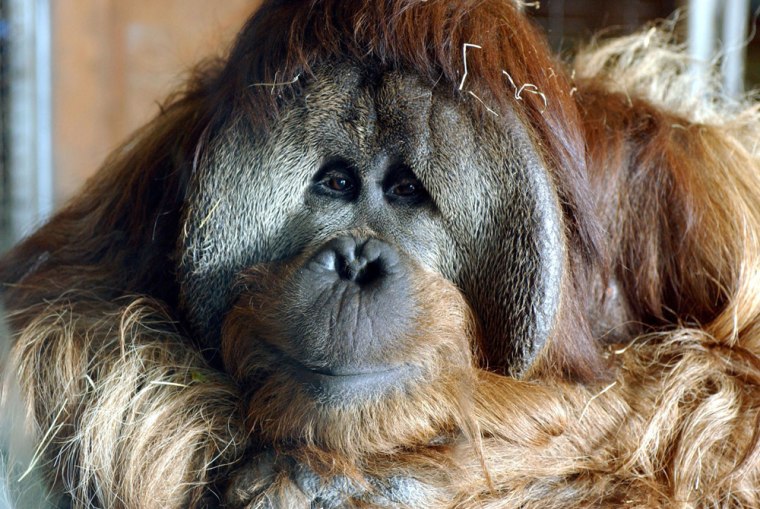Azy and Indah are heading to school this week -- a unique experience for two clever orangutans whose classroom will eventually encompass more than 200 acres of lowlands, river forest and lakes.
On Tuesday, the inquisitive primates will become the first residents of the Great Ape Trust of Iowa. While there, researcher Rob Shumaker and a team of scientists will study the behavior and learning capabilities of the apes.
Azy, 26, and Indah, 24, who are brother and sister, have never lived in the wild. They were born at the National Zoo in Washington, D.C., where they have been part of a research program, the Orangutan Language Project, since 1995.
Shumaker developed the program, which allows the long-haired apes to communicate by selecting symbols on a computer monitor.
"The opportunities that lie ahead for them and this world-class research center are limitless," said Shumaker, the trust's director of orangutan research.
Construction of the Great Ape Trust began in 2003 at the site of a former sand and gravel quarry. Besides orangutans, the Des Moines campus also will house bonobos, chimpanzees and lowland gorillas. Some consider the site the most comprehensive ape research facility in the world.
"Only 30 acres are under development now," Shumaker said. "We've just scratched the surface. This project will be growing for a number of years."
Azy and Indah will arrive at a sanctuary being built south of downtown Des Moines after a 2 1/2-hour charter flight from Washington, D.C.
Shumaker hopes to begin working with the orangutans as soon as Wednesday. Part of what he finds so intriguing about them is their individuality and how they learn.
"Working is one of the most familiar and comfortable things for them," he said. "Starting up with that right away is one of the very best things to make them feel at home."
Both are gentle and even-tempered animals, but Azy -- the male -- is more contemplative. Indah, however, is more impulsive.
"Both eventually learn the same tasks, they understand, they comprehend," Shumaker said. "But how they get to it is very different."
The center also will help promote the conservation of great apes, whose numbers are threatened by habitat destruction and, in the case of mountain gorillas in central Africa, by political unrest.
Orangutans live only in the forests of Borneo and Sumatra in southeast Asia. Scientists predict they will become extinct in Sumatra in the next five years, and in Borneo within the next 10 to 20 years.
Sumatra has about 7,000 orangutans in the wild. An estimated 35,000 to 50,000 live in Borneo, where 10 percent of their habitat disappears every year, Shumaker said.
"Once people begin moving into forests to transform them for other reasons, then you have immediate conflict with apes -- shooting, poaching, taking infants for the pet trade," he said.
Visitors will be allowed in the center from time to time to tour the facilities and watch research.
While it is not necessarily a tourist attraction, it is still a plum for the city, said Greg Edwards, president of the Greater Des Moines Convention and Visitors Bureau.
"I really do think that any project of this magnitude is going to have an impact on us," Edwards said. "It shows we're a progressive city and we're open to economic development such as projects like this."
